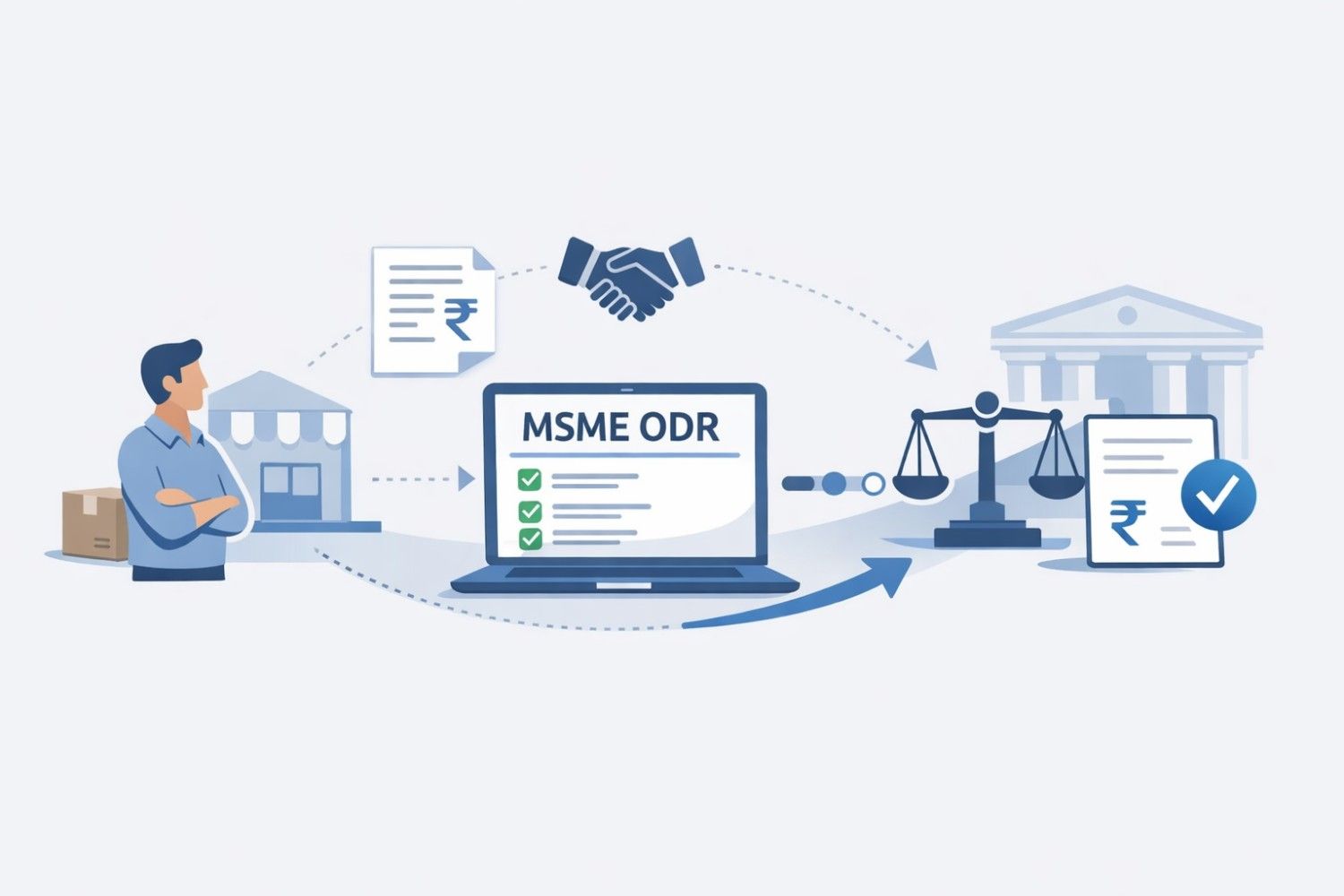AI Contract Automation in India: Benefits, Legal Risks, and the Road Ahead for SMEs
By the SolvLegal Team
Published on: Nov. 5, 2025, 3:59 p.m.

In 2025, AI contract automation in India is transforming how small and medium businesses create and manage legal agreements. Instead of lengthy manual drafting, AI tools now help generate, review, and track contracts within minutes, saving time, reducing legal costs, and improving accuracy.
However, this digital leap also presents new legal challenges, including data protection, enforceability, and over-reliance on machine-generated clauses. Indian laws, such as the Indian Contract Act, 1872, and the Digital Personal Data Protection Act, 2023, continue to govern AI-assisted contracts, underscoring the importance of human oversight.
This blog explains how SMEs can safely adopt AI-based contract tools, understand key compliance risks, learn from real case laws and follow best practices to stay legally secure in India’s growing digital economy.
Introduction: How AI is Transforming Business Contracts in India
It’s 2025, and across India, businesses are closing deals at a pace that would have seemed impossible a decade ago. A startup in Bengaluru can generate a partnership agreement within minutes, while a manufacturing SME in Jaipur finalises supplier contracts without needing a full-time legal team. What’s driving this speed and precision is AI contract automation, a shift that’s quietly redefining how legal work is done.
In plain language, AI contract automation refers to the use of artificial intelligence to draft, review, negotiate, and manage contracts. These systems analyse large volumes of data to suggest accurate clauses, flag inconsistencies, and even predict potential risks. In short, they make contracts faster to create and safer to sign.
This transformation is part of a broader wave of legal tech innovation sweeping through India. The government’s NITI Aayog, through its AI for All and Digital India initiatives, has been encouraging digital adoption across industries, and the legal ecosystem is no exception. With rising pressure to streamline operations and cut compliance costs, SMEs are turning to digital contracts to stay competitive in an increasingly automated economy.
What’s especially exciting is that AI is not replacing human legal expertise; it’s amplifying it. Businesses can now access verified contract templates online, such as a Standard Employment Agreement or a Non-Disclosure Agreement (NDA), and customise them through automation tools that ensure accuracy and compliance. For instance, a startup founder can upload a draft NDA into an AI platform that checks for confidentiality gaps or missing clauses, making legal compliance far more accessible.
The Rise of AI in Contract Management for SMEs
For small and medium enterprises, every hour and every rupee matters. Unlike big corporations with dedicated legal teams, SMEs often juggle multiple responsibilities with limited resources. That’s exactly why AI contract automation has become one of the most valuable tools in their digital transformation journey.
There are a few compelling reasons behind this shift:
- Speed: What once took days of drafting and back-and-forth edits can now be completed in minutes. AI-driven tools instantly generate full contracts based on standard clauses and prior inputs.
- Cost-efficiency: Automating repetitive legal work means businesses spend less on outsourced legal drafting and avoid costly errors.
- Reduced human error: AI platforms identify missing clauses, inconsistent terms, or compliance gaps automatically, ensuring greater accuracy and legal consistency.
- Regulatory alignment: With frequent changes in India’s data and contract laws, AI tools can update templates and clauses in real time to reflect current legal requirements.
Globally, systems like DocuSign, Ironclad, and India’s homegrown platforms, such as SpotDraft and Leegality, have set the standard. These platforms use natural language processing and machine learning to review, draft, and even negotiate standard agreements automatically. Many Indian startups are customising these technologies to meet local needs, from incorporating regional contract law nuances to integrating Indian e-signature mechanisms and ensuring stamp duty compliance.
The rise of this ecosystem hasn’t happened in isolation. Government-led programs such as Digital India, IndiaAI Mission, and Startup India have played a defining role in encouraging digital legal adoption. Agencies such as NITI Aayog and the Ministry of Electronics and Information Technology (MeitY) have consistently emphasised the role of AI in enhancing business efficiency and legal transparency.
For SMEs, the practical applications are easy to see. A small manufacturer can now auto-generate vendor contracts aligned with payment and delivery timelines. A tech startup can quickly create NDAs for new partnerships. Even employment contracts can be tailored for compliance with labor and data protection rules, all within a single dashboard.
In essence, AI contract automation is no longer a luxury. It’s a practical necessity that allows SMEs to move faster, minimise legal risk, and compete with larger players, all while ensuring their agreements remain robust, transparent, and compliant.
Legal and Regulatory Landscape: What Indian Law Says
As powerful as AI contract automation sounds, it operates in a legal space that’s still catching up. India doesn’t yet have a single, comprehensive law regulating artificial intelligence. Instead, businesses must rely on existing frameworks, such as the Information Technology Act, 2000, the Indian Contract Act, 1872, and the Indian Evidence Act, 1872, to determine the validity, enforceability, and evidentiary value of AI-assisted contracts.
Let’s break it down in simple terms:
a. Contract Validity and Consent
Under the Indian Contract Act, 1872, a contract is valid only if it’s made by parties competent to contract, with lawful consideration and “free consent”, i.e. Section 10 and Section 14.
Now, this raises a big question: if an AI drafts or negotiates a contract, who’s actually giving consent? The law currently recognises only natural and legal persons as capable of forming agreements. That means while AI can assist in contract creation, the final consent and acceptance must always come from a human or authorised business representative.
b. Electronic Execution and E-Signatures
The Information Technology Act, 2000, gives legal recognition to electronic records and digital signatures. Sections 3 and 5 validate digital and electronic signatures that comply with the prescribed authentication methods. This means that contracts generated or signed electronically, through platforms such as eSign or DocuSign, are legally enforceable in India, provided they comply with the conditions of the IT Act.
In Trimex International FZE Ltd. v. Vedanta Aluminium Ltd[1]., the Supreme Court recognised that even an email exchange can constitute a valid and binding contract. This case paved the way for recognising digitally executed contracts, an essential foundation for AI-driven systems.
c. Admissibility of Electronic Evidence
Once a contract goes digital, it must also hold up in court. The Indian Evidence Act, 1872, under Section 65B, permits the admissibility of electronic documents, including AI-generated contracts, provided that proper certification is attached.
In State of Maharashtra v. Dr. Praful B. Desai[2], the Supreme Court affirmed that technology, like video conferencing and digital records, is acceptable for legal proceedings. This recognition extends indirectly to contracts created or managed through digital means.
d. Data Privacy and Security Obligations
Contract automation tools handle large volumes of sensitive business and personal data. With the enactment of the Digital Personal Data Protection Act, 2023 (DPDPA), organisations must now ensure that any automated system processing contractual data does so lawfully, securely, and with the consent of the data subject. Non-compliance can lead to significant penalties under the DPDPA.
e. Government Oversight and Policy Direction
Two authorities primarily guide India’s digital governance in this context:
- MeitY (Ministry of Electronics and Information Technology) regulates e-signatures, cybersecurity, and data governance.
- NITI Aayog drives the IndiaAI policy framework, shaping ethical AI standards and digital innovation goals.
While India doesn’t yet have an “AI Contracts Act,” these existing laws and bodies together provide a workable structure. They ensure that digital contracts generated or assisted by AI remain both legally valid and technologically reliable.
Legal and Ethical Challenges of AI Contract Automation
While AI contract automation has made contract management faster and more efficient, it has also created new legal and ethical challenges that Indian SMEs must navigate carefully. These issues often revolve around liability, data protection, algorithmic transparency, and fairness.
1. The Question of Liability
If an AI tool drafts a contract with a missing clause or misleading interpretation, who is accountable: the business using the tool, the AI developer, or the lawyer supervising the process? The Indian Contract Act, 1872, does not yet address this type of liability. Until India introduces clear AI accountability laws, responsibility remains with the human decision-makers who approve and execute the contracts. AI can assist, but it cannot replace professional legal judgment.
2. Data Protection and Confidentiality
AI platforms often process large volumes of sensitive business information, client details, pricing data, or trade secrets. The Digital Personal Data Protection Act, 2023 (DPDPA), now governs the collection, processing, and storage of such data.
SMEs must ensure that their AI vendors follow robust data security practices, utilise encrypted cloud systems, and, preferably, host servers within India. Non-compliance with DPDPA could attract penalties, especially if personal data is misused or leaked.
A simple preventive step is to include data-handling clauses and liability provisions in vendor contracts to clearly define who bears the cost and risk in the event of a breach.
3. Transparency and the “Black Box” Problem
AI models often operate in ways that even their developers cannot fully explain. This “black box” nature raises concerns about transparency in legal contexts. How can a business defend or justify a contract clause that was inserted by an opaque algorithm? SMEs must therefore choose AI tools that allow explainable outputs and maintain audit trails for every automated suggestion.
4. Legal Recognition of Digital Contracts
Digital contracts are fully recognised under Indian law. The Information Technology Act, 2000, in conjunction with the Indian Contract Act, 1872, affords legal validity to electronic records and digital signatures. Courts have also upheld email and online agreements as enforceable, as seen in the Trimex International FZE v. Vedanta Aluminium Ltd. case, where the Supreme Court confirmed that electronic communications can create binding contracts if the essential elements - offer, acceptance, and intent are present.
5. Ethical Implications and Future Regulation
Ethically, there’s growing concern about bias in AI decision-making. If a contract analysis tool is trained on limited or biased data, it may unfairly flag certain clauses or overlook vital legal risks. Transparency, inclusivity, and human supervision are therefore key to ethical use.
The upcoming IndiaAI Mission is expected to develop frameworks for AI accountability and data governance. Once implemented, these could establish standards for fairness, transparency, and auditability, providing much-needed clarity for businesses and regulators alike.
The Compliance Roadmap for Indian SMEs
Adopting AI contract automation is not just a technological shift; it’s a legal responsibility. For India’s small and medium-sized enterprises (SMEs), the challenge lies in striking a balance between innovation and compliance. Here’s a practical roadmap for safely and smartly integrating AI-driven contract systems into daily business operations.
1. Combine automation with human judgment
AI can draft, review, and even suggest edits for contracts, but final verification must always be performed by a qualified human reviewer, preferably a legal expert or in-house counsel. This hybrid approach prevents oversights that machines might miss, particularly when handling nuanced or industry-specific clauses.
2. Ensure e-signature and digital record compliance
Under the Information Technology Act, 2000, digital signatures and electronic contracts are legally recognised if they follow prescribed authentication standards. SMEs should use licensed Certifying Authorities (CAs) and trusted e-sign platforms (like Aadhaar eSign or DocuSign India) to ensure their agreements remain valid and enforceable.
3. Prioritise data protection and confidentiality
AI tools rely heavily on large datasets that may include client details, financial records, and intellectual property information. Compliance with the Digital Personal Data Protection Act, 2023 (DPDPA) is crucial. SMEs should verify that their service providers store and process data securely, ideally on servers located in India, and that contracts clearly outline the data handling responsibilities.
4. Vet your AI vendors carefully
Before onboarding an AI contract automation provider, conduct due diligence. Review their privacy policies, data retention practices, and liability clauses. Businesses should sign a Data Sharing Agreement (DSA) or a Service Level Agreement (SLA) that defines ownership, confidentiality, and response obligations in the event of a data breach.
5. Create internal company policies
AI adoption is most effective when governed by internal compliance rules. SMEs should have clear policies on who can initiate, approve, and sign digital contracts. Regular training sessions on using automation tools responsibly can also help reduce misuse or legal exposure.
6. Use standardised templates for consistency
One of the simplest compliance hacks is using pre-vetted, standardised contract templates. These not only save time but also ensure that essential clauses, such as arbitration, confidentiality, and termination, are never overlooked. SolvLegal offers customizable contract templates and AI-assisted drafting tools that integrate automation with expert legal review, helping SMEs stay compliant without heavy legal costs.
7. Keep records and audit trails
Maintain a secure, digital archive of all contracts, complete with version histories and execution timestamps. This ensures transparency and facilitates the swift resolution of disputes if they arise.
Conclusion
AI contract automation is no longer a futuristic experiment; it’s fast becoming the backbone of how Indian businesses negotiate, execute, and manage agreements. For SMEs, especially those scaling quickly, it offers an incredible mix of efficiency, accuracy, and accessibility. Contracts that once took weeks of back-and-forth can now be drafted, reviewed, and signed in a single day, saving both time and legal costs.
But this innovation demands careful handling. As India’s digital and legal ecosystems evolve under initiatives like Digital India, the IndiaAI Mission, and the DPDPA 2023, the priority must be responsible adoption. Automation should complement, not replace, legal expertise. AI can process and analyze, but only humans can interpret context, intent, and fairness, the very soul of any contract.
Looking ahead, it’s likely that India will introduce AI governance norms and legal recognition for AI-generated contracts. Courts may begin referring to automated audit trails and smart-contract logs as credible forms of digital evidence. Until then, businesses must operate within existing frameworks, verifying outputs, ensuring data compliance, and maintaining human oversight.
For Indian SMEs, the message is simple: treat AI as your assistant, not your lawyer! Use it to simplify workflows, reduce clerical errors, and enhance consistency, but always keep a legal expert in the loop.
At SolvLegal, we believe the future of business contracting lies in striking this balance, where technology handles the routine and human insight ensures trust and compliance. By combining AI-powered contract automation with expert legal review, SolvLegal helps SMEs move faster, safer, and smarter in the digital age.
FAQ’s
1. What is AI contract automation in simple terms?
It means using artificial intelligence to create, review, and manage business contracts automatically, helping companies save time, avoid errors, and stay legally compliant.
2. How can AI contract automation help Indian SMEs?
AI tools enable contract work to be completed more quickly and cost-effectively. SMEs can easily handle NDAs, vendor agreements, and employment contracts without hiring a large legal team.
3. Are AI-generated contracts legally valid in India?
Yes. Under the Indian Contract Act, 1872, a contract made or signed digitally (like through email or e-sign) is valid if there’s free consent and lawful consideration.
4. What legal risks come with using AI in contracts?
AI tools can sometimes misread context or create unclear clauses. Businesses should always have a lawyer review key contracts before they are signed.
5. How can SMEs ensure compliance while using AI tools?
Choose trusted legal tech providers, check their privacy policies, and ensure data protection under the Digital Personal Data Protection Act, 2023. Human oversight is a must.
6. Will my digital contract made through AI be accepted in court?
Yes, as long as both parties agree and it’s signed properly, even digitally. Courts in India have accepted e-mails and e-signatures as valid proof of agreement.
7. Can AI replace lawyers in contract drafting?
Not really. AI simplifies the process, but it can’t replace legal judgment, negotiation skills, or understanding of business intent. It’s best seen as a smart assistant for lawyers, not a substitute.
Related article:
1. ESG Compliance for Indian business in 2025: Legal requirements and risks.
2. Is Your Work Fuelling AI Without Consent?
About the author: Gaurav Saxena is the founder of SolvLegal, where he brings together dual expertise in engineering and law to guide clients through complex corporate and compliance matters. With a strong grounding in the law of contracts, corporate law, intellectual property, IT law and data privacy, he works with startups and established businesses alike to structure agreements, advise on governance and safeguard innovation.
ABOUT THE AUTHOR
Kunal Singh is a second-year B.Sc. LL.B. (Hons.) student at National Forensic Sciences University, Gandhinagar.
REVIEWED BY, Gaurav Saxena a corporate lawyer focusing on company law, commercial agreements, and compliance strategy. He is the Founder of SolvLegal and a dual-degree professional with expertise in Law and Engineering. A graduate of the University of Lucknow, he has a deep understanding of Contract Law, Corporate Law, Intellectual Property Rights, Information Technology Law, and Data Privacy.
Disclaimer
The information provided in this article is for general educational purposes and does not constitute a legal advice. Readers are encouraged to seek professional counsel before acting on any information herein. SolvLegal, the author and the contributor disclaim any liability arising from reliance on this content. Connect with SolvLegal on LinkedIn.
[1] MANU/SC/0057/2010
[2] MANU/SC/0268/2003






